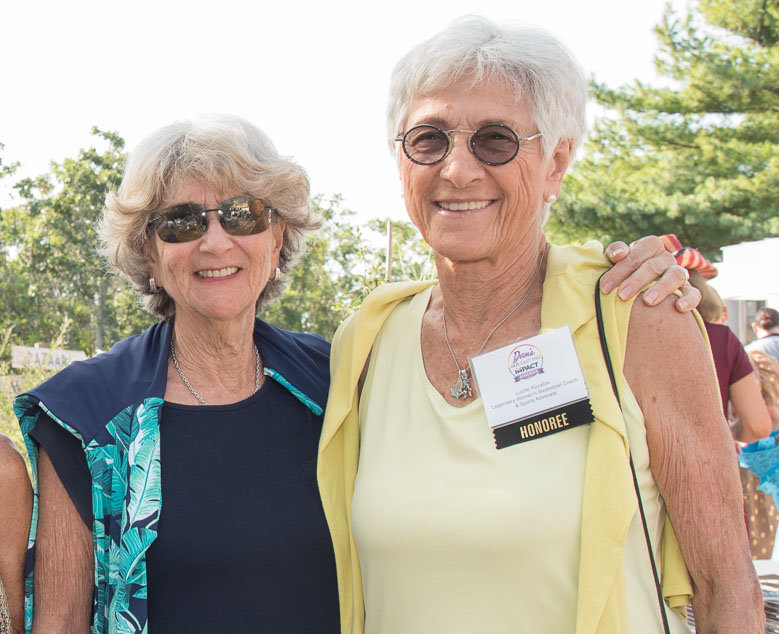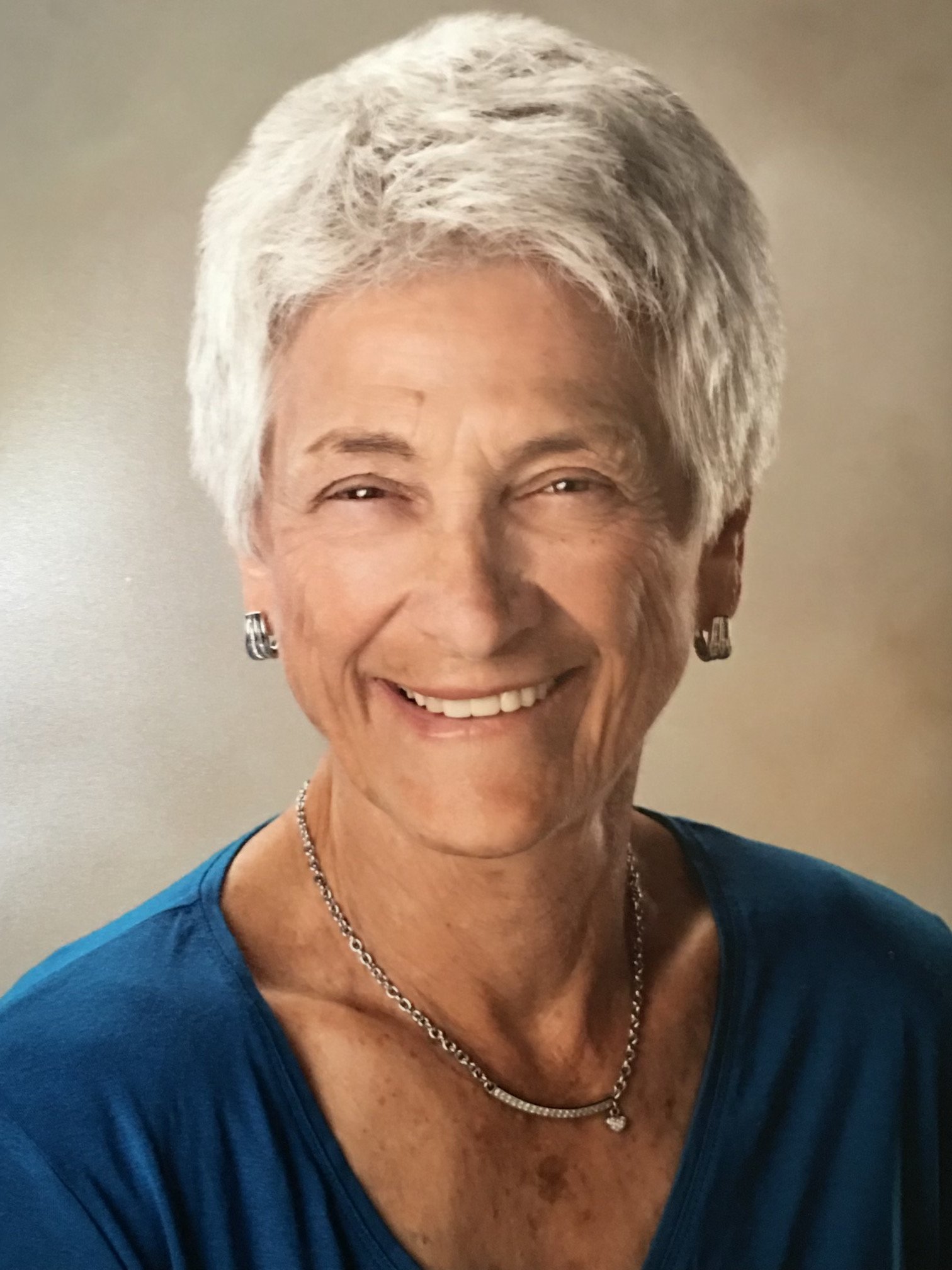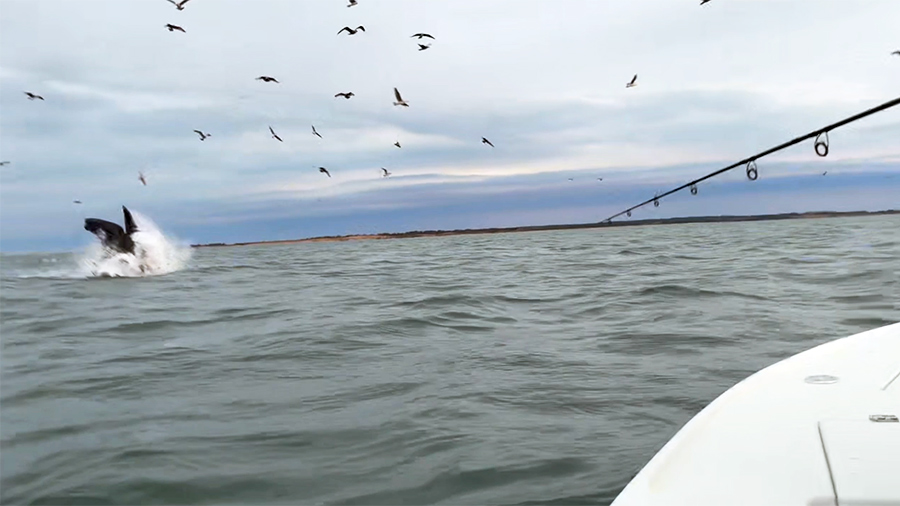Lucille Kyvallos: Legendary Women’s Basketball Coach & How She Changed the Game

To appreciate legendary basketball coach Lucille Kyvallos and what she achieved for women in sports, you have to go back in time — to the 1960s and ’70s.
“You know the expression ‘You throw like a girl?’” Kyvallos tosses out the question as easily as she can sink a free throw.
“It’s an old expression, and some of that still exists today,” says Kyvallos, “but back in my day boys didn’t want to play with girls … back then was the dark ages — you had to have dolls when you were a little kid, you had assigned roles.”
When it came down to Barbie dolls or basketball, the choice for Kyvallos was clear.
“Basketball — I made a case for it,” she says, even though “walking the streets, people (then) were very judgmental.”
Kyvallos, was a natural athlete who grew up in Astoria and played on the multicultural street in New York City with the boys. She was better in basketball than most of her peers, female or male. A lot better.
She went on to teach Phys Ed at Queens College where she was a faculty member for 30 years. But it is her 12 years as head coach at Queens College from 1968 to 1981 during her tenure there that cemented her legacy.
Kyvallos not only developed the Queens College women’s basketball team where there hadn’t been much of one, she lead them to the championships — and in 1975, made history, when she brought her team to play at Madison Square Garden — it was the first women’s basketball game to be played in that arena.
She has received many acknowledgements and awards in her lifetime, including the Joe Lapchick Character Award in 2015, for demonstrated honorable character throughout her basketball career. Her 1972–73 squad was the first women’s basketball team to be inducted into the New York City Basketball Hall of Fame— where she herself was also inducted.
Not only was she inducted into the Queens College Athletics Hall of Fame, in 2017 but Queens College renamed their basketball court Lucille Kyvallos Court in her honor. This summer Dan’s Papers was honored to present Kyallos with a special Out East End Impact Award for Lifetime Achievement and Inspiration.
Today, at age 89, Kyvallos may be retired, but she is far from the retiring type.
An avid, competitive tennis player who plays for the United States Tennis Association Senior League, she had been preparing for an international world tournament to be held this month in Majorca, Spain, until the USTA recently pulled all of its teams due to COVID concerns.
We caught up with Kyvallos via phone from her home in Sag Harbor to talk about her career, how she broke the mold for women in sports and her insights on living a long, healthy life.

Walk us through your approach and your impact at Queens College.
Back then there was no interscholastic program for girls in high school in New York City, so I didn’t have much to draw from — the Catholic schools had some.
I was basically teaching the fundamentals and training them and doing all the things to make them competent athletes — skills, tactics and strategy — the way they viewed themselves. For instance, if there was a loose ball and two opponents went for it, they would stop instead of fighting for the ball. I taught them to be assertive and aggressive, to work hard, to take responsibility, to rise to the occasion under pressure and to function as a team.
And girls and women tend to take a back seat in competition.
There was a book written back in the 1980s or ’70s for managerial women — From Locker Room to Boardroom — to me that’s a real path, learning to function as a team, being assertive, setting goals and how to achieve those goals. We do that now as women but back then in the 1960s and ’70s it was unheard of.
Sex roles were assigned to us, we couldn’t be who we really wanted to be — we had to break those barriers. What I did was I trained a team to function very well and we gained national recognition.
What was that path like leading up to the game changer at MSG?
We presented ourselves at Queens College as the model for the city and Long Island. They had just started to develop high school programs for girls in the city and we were the model — the gym was packed all the time.
In 1973 we got to the finals and lost to a little Catholic college (Immaculata College) from Pennsylvania — we were runners up. They were an undefeated team … they were undefeated for two and a half years when we lost to them in 1973.
In 1975 we were invited to play at Madison Square Garden, which was a big deal. They had a collegiate program but (at the time) they only had men’s games in the Garden that drew 4,000 people.
When we got invited, I knew this was a major occurrence. I invited Immaculata College as our opponent, that generated a lot of interest — 12,000 people … we beat them. And that went viral in the basketball world — viral all over the country. We had a momentum and generated a lot of interest and a lot of spectators … and it alerted the NCAA — they were not happy with this publicity and interest. Then it really started to move on Title IX … I didn’t plan to change the culture and the attitudes of society about sports. I was so driven. …
Back in 1973 three things had happened — in 1972 Title IX was passed (ending gender discrimination in sports), Billie Jean King beat Bobby Riggs in 1973 and in 1975 (Queens College) Madison Square Garden. … When we were in Madison Square Garden in 1975, Billie Jean attended that game — sitting in the boonies because she didn’t want people to know she was there to take away attention.
When both teams came out to warm up, all of a sudden the lights dimmed and (a recording of) Helen Reddy singing “I Am Woman” played — all those social and cultural changes — it was so loud!
Who encouraged you growing up, and how did your career in sports develop?
My mother never encouraged me, my father did. … It demonstrates the attitudes at the time. …
I was a phenomenal athlete on my block, playing with boys all the time — I played on a lot of recreational teams in tournaments and leagues sponsored by PAL or the Park Department. I always ended up as the high scorer in basketball … but I never had the opportunity to play on a girls high school or intercollegiate team or the Olympics, which I probably could have done.
I always felt deprived of the opportunity to develop my own skills and all this motivation poured into girls and women’s sports.
I graduated, took a job at a high school on Long Island for three years, then went to Indiana University for my masters where I really learned the science of movement. I had the practical experience from growing up, from playing games with kids on the block — throwing, running, change of direction, spatial perceptions — those were all there but when I went for my masters, I learned the intellectual part of all that. …
In 1966 when I got to Queens College (after teaching at universities in Rhode Island and in Pennsylvania) I was not assigned women’s basketball, I started coaching in 1968.
I coached for 12 years but I was at Queens College (as a faculty member) for 30 years. I retired in 1995.
How have things changed?
In the early ’80s things started to change in the women’s basketball program. Division 1 schools started giving money and scholarships … men finally caught on to it and started having programs for women.
How do you view women’s sports today?
I’m thrilled about it because young women, whether or not they are basketball players or tennis players, they are training hard — the programs are more challenging and they are advancing in their skill level.
I think that the level of achievement and performance and excellence of these young women athletes is superb.
When and why did you come out East?
I started coming here in 1980. I bought my house in 1983. I felt it was a wonderful, charming place to be in with nature and so beautiful.
I live six months here and six months in Florida.
Any motivational advice for those who want to stay fit?
It depends on the person. If you function better in a group, find a group to go to and workout … toning classes and Zumba classes — I took one, not easy.
You have to be resourceful; hook up in East Hampton, the recreation center. Pickleball — a lot of people are playing it; they love it. Taking walks on beaches, a little run here and there, cycling lot of things.
I don’t eat fried foods. I eat fresh foods, eggs, some protein, no meat — just fish and chicken and a lot of salads and broccoli. I started doing shakes and I have protein powder — now you need carbs before working out, protein after.
I find the older I get, the more I have to do my maintenance — the down side, we’re not young any more.
What’s the secret to longevity?
I can’t believe I’m going to be 90 next year [laughs]. I feel good. The secret for me is to continually work out. I have a trainer twice a week, I play tennis four times a week. I try to stay healthy, my biggest problem is hydration — I drink 70 ounces of water a day.
Longevity is really a matter of staying active and other healthy things. If you are a couch potato — forget it. You either use it or lose it.
OUT EAST END PICKS
North Fork Women @ American Beech
First Friday Friends
North Fork Women
Starts October 1, 6-7 p.m.
American Beech Restaurant
300 Main Street, Greenport
631-477-8464
Make new friends or hang with old ones at North Fork Women’s First Friday Friends gathering on October 1 at the ultra-cool American Beech Restaurant. Indoors/outdoors so pick your spot and celebrate fall.
info@northforkwomen.org
Walk with Pride
Show your colors in these way-cool Adidas Nizza slip on pride slides that spell “Love Unites.”
$70, addidas.com
Come Out, Come Out Day
October 8 is LGBT Network’s 20th annual National Coming Out Day — a one-day community effort aimed to engage communities to wear a rainbow ribbon and/or trans ribbons to visually “come out” in support of LGBTQ+ people. Get the FREE Campaign Organizing Kit for schools, organizations and businesses.
Sign up at weartheribbon.org
Born this Way Uggs
These Fluff Yeah Sandals are, yeah, worth the splurge.
$100+, ugg.com/pride-for-all
Isaac Mizrahi Double Header Weekend Oct. 9/10
Bursting with ideas and talent, don’t miss the fashion icon-turned-cabaret star at Bay Street, in concert Saturday, October 9 with his jazz band, and then on Sunday, October 10 in a live talkback after his documentary Unzipped is screened.
baystreet.org
Hamptons Youth Squad in Sag Harbor
Old Whaler’s Church
44 Union StreetSag Harbor
The LGBT Network’s Youth Squad group program is back to an in-person format at its Hamptons Center in Sag Harbor. Support, socialize in a safe environment. Wednesday 4–6 p.m. through October and November.
lgbtnetwork.org



